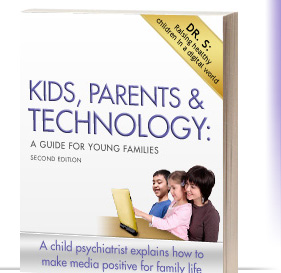1.27.2010
APPLE TABLET: Does America’s Youth Need Yet Another Great Tech Device?
1/5 of kids 8-18 spend up to 19 hrs/d (including texting and multitasking) total media time. Media use is associated with poorer grades and family life and less reading and imaginative play. When parents set limits for 1/3 of youngsters, media consumption drops by only 1/3, showing that restriction is just not enough.
Technology is great — we need to use it in positive, proactive family-centered applications. But in the 10+ years of media explosion into the lives of younger and younger children, there has been little systematic effort to guide parents about their best use.
My advice: Parent have home court advantage, but there is no quick fix. Their commitment must be big, and they need good expert help. Parents should plan kids’ media use just like they plan meals for healthy nutrition. Start early and work at it as part of daily parenting. A Media Plan must be based on sound child development and family health principles and must help families succeed as their kids brains are wired actively during early childhood. It must prevent improper chaotic use in the teen years before it starts.
Does America’s youth need another great tech device? Yes and no, depending how it is used, and parents must be in charge.




Buy an Apple iPad for Your Child?
1.31.10
I personally love good technology and will probably get an iPad or something like it for myself. But before bringing a new gadget home, every parent must think through its impact on the kids and family life.
Kids left to themselves consume media as they do junk food. The more the media, the poorer the grades and the lesser imaginative play and family interactions. According to a recent Kaiser Family Foundation poll, 1/5 of those ages eight to eighteen now get as much as nineteen hours of media daily but report more unhappiness.
I am also concerned that parent distraction by media might be damaging vital formation of youngsters’ brain circuits. I have seen mothers on their cell phones or texting while breast-feeding –surely they are not fully present with their infants at a key moment. Can such interruptions in bonding contribute to later brain-based problems, including to the recent rise autism? There can be great benefits to technology, but there are alarming trends and important unanswered questions.
I believe that parents should commit to leading their youngsters towards positive uses whatever electronic media happen to us. They should plan media consumption as they do meals, and for the long run, as they do for college. By being fully present and applying sound child-rearing and family support principles, parents can now create balanced media plans that lead youngsters to the values and orientation they will need to succeed in an increasingly technology-rich world.